The Tale of New Spain
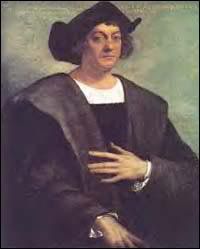 Spanish sailor Cristobal Colon was one of the few people to answer to Queen Isabella's call for intrepid sailors who would be willing, in the name of Spain, to search for the New World and return with maps. His bid was temporarily put down with the death of Isabella and the rise of Gaspar Guzman de Olivares, who balked at any notion of exploration and instead focused on establishing his own power. Unfortunately the Conquistadors under Carlos V were successful and Isabella's lineage was returned to the throne. Carlos revived Isabella's plan for exploration of the new world, and called upon the services the young and ambitious Cristobal Colon... except he was no longer young, and hardly ambitious. After negotiating a deal with Emperor Carlos V and his chief Naval Officer, Admiral Jose Maria de Hidalgo, they convinced the old man to muster his men for one last voyage; one that would make him the governor of any new territory discovered for Spain.
Spanish sailor Cristobal Colon was one of the few people to answer to Queen Isabella's call for intrepid sailors who would be willing, in the name of Spain, to search for the New World and return with maps. His bid was temporarily put down with the death of Isabella and the rise of Gaspar Guzman de Olivares, who balked at any notion of exploration and instead focused on establishing his own power. Unfortunately the Conquistadors under Carlos V were successful and Isabella's lineage was returned to the throne. Carlos revived Isabella's plan for exploration of the new world, and called upon the services the young and ambitious Cristobal Colon... except he was no longer young, and hardly ambitious. After negotiating a deal with Emperor Carlos V and his chief Naval Officer, Admiral Jose Maria de Hidalgo, they convinced the old man to muster his men for one last voyage; one that would make him the governor of any new territory discovered for Spain.
It was around this time that the Northern Alliance (Inca, English) decided to release a plan calling for organization of the New World settlements, their own official claim to the entire New World, and of course plans to give land grants to countries in need (such as America, France, and Germany). Part of the statement was particularly bothersome to the Emperor...
With this statement looming overhead the mission had a setback, the only problem was that the ship had already left from Santo Rodrigo on its quest, so Spanish Foreign Minister Pedro Abarca de Bolea had to work quickly in order to assure the safety of the crew (which was primarily private citizens, and not military, however there were sufficient military forces to warrant problems from the English and Inca if they were so inclined). After negotiations finished Bolea had ensured not only the safe passage of Colon's crew, but also a military agreement in general with Spain against barbarians, as well as a promise that Spain would either recieve a barbarian city or a land grant in return.
The following is a collection of excerpts from the journals of General DeMores, Cristobal Colon, and Admiral Hidalgo...
1288 a.d. - The people on the ship are growing restless, rumors of a mutiny have begun. I knew I should have stayed home, I knew once the war started and I lost support of the throne I had been saved from a terrible mistake. We have no proof of the New World! Only stories from the English and Inca, who have been our enemies as of late. Our Emperor believes them! It is quite foolish indeed, and this should prove how much faith in this mission and the so-called Admiral. It is insane that I, a merchant of great experience and expertise, have to succumb to the will of this boy Admiral, this Hidalgo. What could he possibly know about ships? Spain doesn't have a navy! Well, it seems as if dinner has been prepared, that is the one thing I can say about this mission - thus far we have been well stocked with food.
-Cristobal Colon
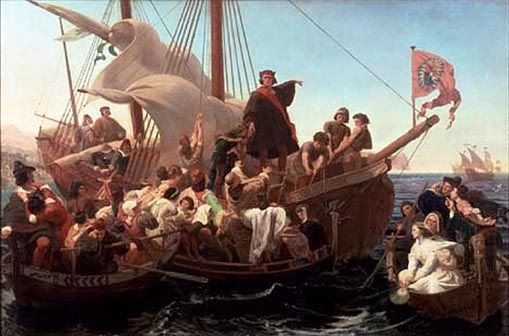 1292 a.d. - We have seen many things on our journey, but the latest two things have been the most promising; a Chinese ship, and land! Glorious land! There has been no evidence of natives, however, we've only seen forests and hills so far, no sign of roads, farming, mining, or even any smoke. We are begining to think this world may be uninhabited, but we can be sure from the absence of development that we are seeing virgin soil (unless of course we are somewhere undeveloped, like France, which would prove to be embarassing). Even the melencholy mood of that old man Cristobal has improved, the second he saw the Chinese ship you should have seen his eyes; he was so worried that there would be an insurrection, but we have enough men to contain any type of uprising, besides, these sailors will be payed handsomely when we return to Spain. In any event we should reach land very shortly, of course our first order of business will be to ensure that we have a place to break camp, and potentially leave behind a few people while the rest remain on the ship to explore the rest of this continent.
1292 a.d. - We have seen many things on our journey, but the latest two things have been the most promising; a Chinese ship, and land! Glorious land! There has been no evidence of natives, however, we've only seen forests and hills so far, no sign of roads, farming, mining, or even any smoke. We are begining to think this world may be uninhabited, but we can be sure from the absence of development that we are seeing virgin soil (unless of course we are somewhere undeveloped, like France, which would prove to be embarassing). Even the melencholy mood of that old man Cristobal has improved, the second he saw the Chinese ship you should have seen his eyes; he was so worried that there would be an insurrection, but we have enough men to contain any type of uprising, besides, these sailors will be payed handsomely when we return to Spain. In any event we should reach land very shortly, of course our first order of business will be to ensure that we have a place to break camp, and potentially leave behind a few people while the rest remain on the ship to explore the rest of this continent.
-Admiral Hidalgo
1292 a.d. - These sailors are a joke! I can't wait to see some action, the Chinese commanders have already told me rumors that we were sending another ship, with more troops, under the command of Prince Carlos VI! I can't wait, but in case these are lies I want to keep it from the old man and the Admiral, they don't need to know about this, it will make the sailors lazy anyway. It is going to be there job to find food for everyone, and if they think we have armies coming they'll stop, I know this lot, they are about as loyal as the Imperial coffers allow them to be. Supposedly there is a barbarian Empire in this continent's interior, they call themselves the Numidians. The Chinese say they have an impressive city, but not as impressive as the Sarmatians, we will see how impressive these barbaric weapons can be, hopefully sooner rather than later.
-General DeMores
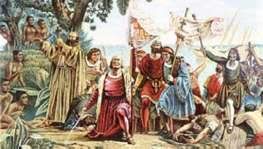 1293 a.d. - We reached land sometime in the morning that day, and decided to make our presence felt by lodging the banner of the Holy Spanish Empire and spreading the word of God to the natives, who told us of two tyrannical Empires; the Numidians and Sarmatians, who had control of this area of the New World. They assured us that despite their own simple existance, the Numidians and Sarmatians had powerful armies and lived in large cities that were said to rival even those of Spain! My men were already worried, and wished to return to the ship, which we did. When I told General DeMores about the barbarian Empires he assured me that Spain would crush them, and said from now on our mission would be to discover their locations and bring in military forces. It had also come to his attention that our diplomats had made an agreement with the Inca which would in turn bring a force of Spanish Conquistadors to the area, so many things are happening this old man is feeling a bit overwhelmed.
1293 a.d. - We reached land sometime in the morning that day, and decided to make our presence felt by lodging the banner of the Holy Spanish Empire and spreading the word of God to the natives, who told us of two tyrannical Empires; the Numidians and Sarmatians, who had control of this area of the New World. They assured us that despite their own simple existance, the Numidians and Sarmatians had powerful armies and lived in large cities that were said to rival even those of Spain! My men were already worried, and wished to return to the ship, which we did. When I told General DeMores about the barbarian Empires he assured me that Spain would crush them, and said from now on our mission would be to discover their locations and bring in military forces. It had also come to his attention that our diplomats had made an agreement with the Inca which would in turn bring a force of Spanish Conquistadors to the area, so many things are happening this old man is feeling a bit overwhelmed.
-Cristobal Colon
1301 a.d.- We continued on our quest to map the continent, which was proving to be much larger than anticipated. The General stayed behind to meet the troops arriving from Cuzco, while Cristobal and I commanded the fleet towards the south of the continent, it came to our attention that the English had already established settlements including the conquest of the Vandal empire, and the territory of Illinois, word from the English claimed that the Sarmatian Empire was due north of Illinois but warned us that Sarmatian ships were powerful, and would challenge our authority over the seas. We weren't worried however, as there was no evidence to support that the natives had the technological advancements we had; clearly there were roads, but none that could compare to those in the old Continent.
-Admiral Hidalgo
1306 a.d. - Our soldiers reached the New World along with Prince Carlos VI, who I was pleased to meet. He had recently married the daughter of the great General Mendoza and wanted to establish himself as a military commander; so he came along with the Conquistadors. We met with the Incan army, and things were quite tense at first, however we learned to work together and it showed that through cooperation we could settle our differences, it was from the coast that we marched towards Numidia, the capital city of the heathen Numidians...
-General DeMores
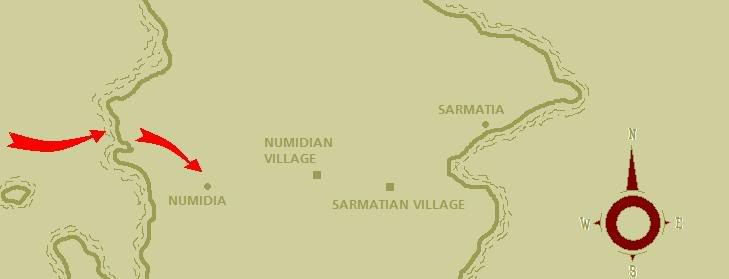
1310 a.d. - After three years of battle we finally broke the city walls, I suffered some slight injuries but two whole garrisons of Conquistadors bravely lost their lives at the walls of Numidia, a combined force of Incan, Spanish, and English troops took the barbarian city down to the jubilation of the surrounding natives. I will have to spend much time here with Prince Carlos VI as the Incans have no officials to rule the city, so it is going to be up to us to stamp out the Numidian insurgency and establish order in the city. We will then make our treck to Sarmatia, as the Prince assures us that Spanish Cavalry will soon arrive in the area...
-General DeMores
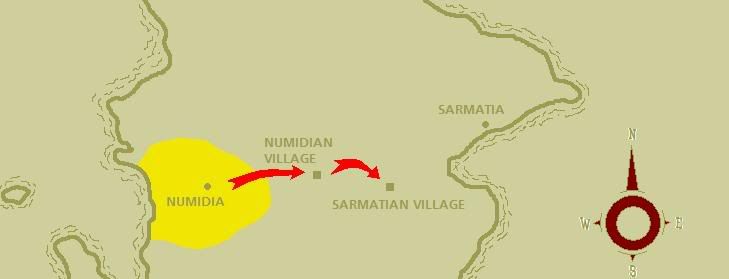
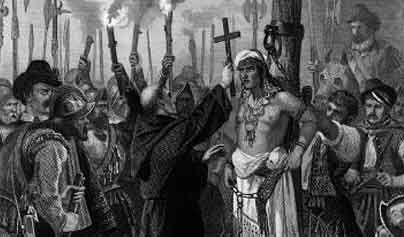 1314 a.d. - Under the command of Prince Carlos VI our forces marched east towards a hold-out Numidian village, which was quite easy to defeat (their only forces were crude bowmen), the village was plundered of the small riches it had and the natives were questioned as to the location and power of the Sarmatian Empire. Apparently prior to the landing of the Inca, the Numidians and Sarmatians had brokered a peace which gave them control of the entire area, including control over the natives. The villagers told us that one such village was to our east, and north of that area would be the Sarmatian capital. Our men fought bravely and destroyed the second village, finally arriving at Sarmatia, which was quite large and well defended.
1314 a.d. - Under the command of Prince Carlos VI our forces marched east towards a hold-out Numidian village, which was quite easy to defeat (their only forces were crude bowmen), the village was plundered of the small riches it had and the natives were questioned as to the location and power of the Sarmatian Empire. Apparently prior to the landing of the Inca, the Numidians and Sarmatians had brokered a peace which gave them control of the entire area, including control over the natives. The villagers told us that one such village was to our east, and north of that area would be the Sarmatian capital. Our men fought bravely and destroyed the second village, finally arriving at Sarmatia, which was quite large and well defended.
-General DeMores
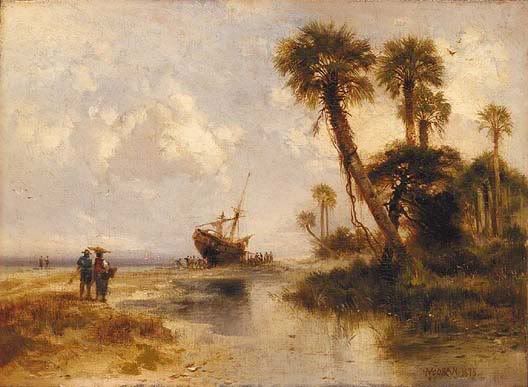 1328 a.d. - We should have listened to the English! The Sarmatian fleet met us just north of Illinois, and the Admiral decided to engage them directly, causing the death of numerous sailors and soldiers despite our victory. Admiral Hidalgo said it would be best for us to beach our ship until we can finish repairs, and generally search the area, according to his map we should be quite close to the Sarmatian empire, and thus close to the forces of General DeMores and Prince Carlos VI. I am begining to think I will not survive this trek to make it back to Spain, let alone to govern any territory in this wild part of Terra. Perhaps history could be my prize, hopefully by the end of this journey my regrets will be gone. But alas, I realize that at any moment my life could end whether it by the hand of the heathens, or the hand of God Himself.
1328 a.d. - We should have listened to the English! The Sarmatian fleet met us just north of Illinois, and the Admiral decided to engage them directly, causing the death of numerous sailors and soldiers despite our victory. Admiral Hidalgo said it would be best for us to beach our ship until we can finish repairs, and generally search the area, according to his map we should be quite close to the Sarmatian empire, and thus close to the forces of General DeMores and Prince Carlos VI. I am begining to think I will not survive this trek to make it back to Spain, let alone to govern any territory in this wild part of Terra. Perhaps history could be my prize, hopefully by the end of this journey my regrets will be gone. But alas, I realize that at any moment my life could end whether it by the hand of the heathens, or the hand of God Himself.
-Cristobal Colon
1328 a.d. - Hail the Spanish navy! Finally some action! The Sarmatian triremes were no match for us, and we sent them deep into the unforgiving sea with a message to their ancestors; you will soon be meeting the remnants of your people! Certainly the armies of DeMores and Carlos are close to Sarmatia, why else would they send this fleet against us? That old man Cristobal can worry all he wants, and complain about his men dying, but that is what they signed up for and they knew the risks of this voyage. I can't wait to return to Spain and tell the Emperor of my victory and of our successes, certainly Pope Paul will appreciate a New World for the one true faith to spread and grow in! I am quite optimistic, and hope to make it to Sarmatia before the battle ends, how glorious it will be to see the forces of Holy Spain smite the evil heathens!
-Admiral Hidalgo
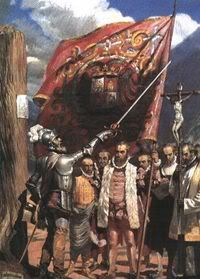 1347 a.d. - Captain William Manning, who was running things in England made a surprise visit to our camp, and held a meeting with Prince Carlos and I. He was happy to discover that Carlos VI married General Mendoza's daughter, Manning apparently had been a friend of Mendoza's many years ago, and appreciated hearing about Mendoza's granddaughter. He was a very nice man, who seemed to be unaffected by his rise to power, he expressed hopes that our countries could again be friends and discussed plans to use English troops to help the Spanish put down the Sarmatian defenses. It was quite strange to me how new everything was here, the New World was truly that; where else would you see Spain fighting alongside the Northern Alliance? Things were different here though, the treaties and feelings of the old world were gone and were replaced with a feeling of brotherhood, and mutual protection against unknown barbarian enemies. Captain Manning told us that English and Incan forces were on the way, and we would be wise to make camp among the forests in the hills near Sarmatia, he suggested that we not give word to the Sarmatians that we intend on attacking, and they may not bother us. Things were about to get interesting, and I could prove my salt as a General here on this day in Sarmatia!
1347 a.d. - Captain William Manning, who was running things in England made a surprise visit to our camp, and held a meeting with Prince Carlos and I. He was happy to discover that Carlos VI married General Mendoza's daughter, Manning apparently had been a friend of Mendoza's many years ago, and appreciated hearing about Mendoza's granddaughter. He was a very nice man, who seemed to be unaffected by his rise to power, he expressed hopes that our countries could again be friends and discussed plans to use English troops to help the Spanish put down the Sarmatian defenses. It was quite strange to me how new everything was here, the New World was truly that; where else would you see Spain fighting alongside the Northern Alliance? Things were different here though, the treaties and feelings of the old world were gone and were replaced with a feeling of brotherhood, and mutual protection against unknown barbarian enemies. Captain Manning told us that English and Incan forces were on the way, and we would be wise to make camp among the forests in the hills near Sarmatia, he suggested that we not give word to the Sarmatians that we intend on attacking, and they may not bother us. Things were about to get interesting, and I could prove my salt as a General here on this day in Sarmatia!
-General DeMores
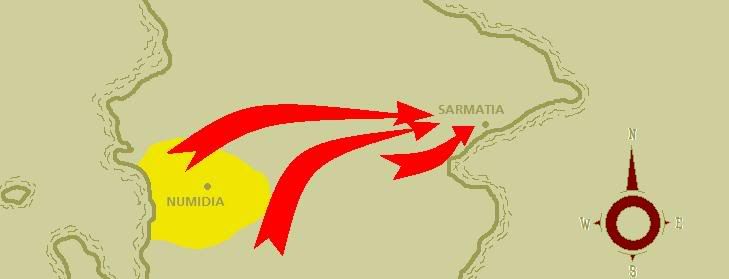
1350 a.d. - Finally the Incan and English troops arrived as Manning had promised, their catapults rained down fireballs upon the unsuspecting Sarmatian rabble. Incan, English and Spanish Cavalry punished their defenses, until finally our Conquistadors cleaned up the mess and the Spanish flag was raised over the city. Quickly the soldiers went to work dismantling the pagan shrines and altars in the city to make way for Christian missionaries. The insurgency raged on for many nights, but ultimately could not withstand our forces. The Emperor will be proud, as proud as I am today, of the work we have done and would be quite interested to note that the Incan and English kept up their end of the deal, so now we had to keep up ours. The Prince named Cristobal Colon the governor, but will rule the city until his arrival with Admiral Hidalgo, I am sure both will be impressed with the skill displayed by the Spanish military.
-General DeMores
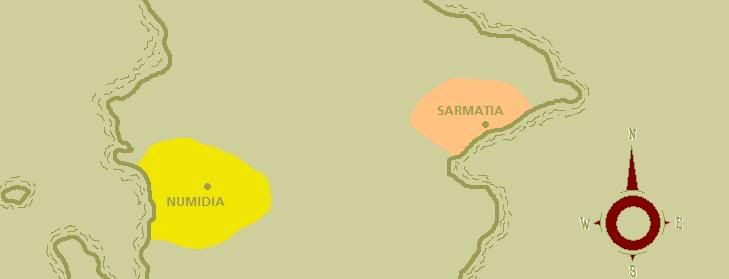
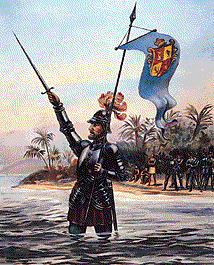 1350 a.d. - When we reached the city it was hard to tell whether or not the day was ours, until General DeMores himself ran into the sea holding up a large blue banner holding the crest of Spain and the House of Bourbon (to which Prince Carlos VI held his allegience). We knew then that we were safe, and the look on Cristobal's face was priceless; it was the face of an old man, who had worked hard all of his life finally seeing his retirement, he would be governor of Sarmatia - the largest Empire in the New World - he would be the favorite of the Emperor, and would be known throughout history as the man who cased this, despite his lack of actual involvement in the military victories. Regardless, I am happy for him, he put a lot on the line out here and everything worked out for him. I am sure all of us will return to Spain with more prestige than when we left it. I myself have changed, early on in the voyage, when we left Santo Rodrigo I thought they sent me on a wild goose chase! Braving the icebergs of the harsh nothern oceans, I thought this was a futile attempt. But now I realize what glory we have achieved, I can say to my family and friends when I return, to my Emperor, that I braved the mysterious seas, the dark jungles, and the raging barbarians of the New World for Spain! I was proud to do it, and I will never forget this journey and the sacrafices of the brave sailors and soldiers, Spanish, English, Incan alike, who risked their lives for glory, God and Country!
1350 a.d. - When we reached the city it was hard to tell whether or not the day was ours, until General DeMores himself ran into the sea holding up a large blue banner holding the crest of Spain and the House of Bourbon (to which Prince Carlos VI held his allegience). We knew then that we were safe, and the look on Cristobal's face was priceless; it was the face of an old man, who had worked hard all of his life finally seeing his retirement, he would be governor of Sarmatia - the largest Empire in the New World - he would be the favorite of the Emperor, and would be known throughout history as the man who cased this, despite his lack of actual involvement in the military victories. Regardless, I am happy for him, he put a lot on the line out here and everything worked out for him. I am sure all of us will return to Spain with more prestige than when we left it. I myself have changed, early on in the voyage, when we left Santo Rodrigo I thought they sent me on a wild goose chase! Braving the icebergs of the harsh nothern oceans, I thought this was a futile attempt. But now I realize what glory we have achieved, I can say to my family and friends when I return, to my Emperor, that I braved the mysterious seas, the dark jungles, and the raging barbarians of the New World for Spain! I was proud to do it, and I will never forget this journey and the sacrafices of the brave sailors and soldiers, Spanish, English, Incan alike, who risked their lives for glory, God and Country!
-Admiral Hidalgo
Back in Madrid, Years Later...
Cristobal Colon became the Imperial Governor of Sarmatia, which was renamed San Pedro in honor of Czar Peter II who converted Russia to Christianity. He returned to Madrid with gold plundered from the campaign, which was well recieved in the courth of Carlos V, he also brought slaves, spices, and tales of adventure that all Spaniards could be proud of. He brought back a newfound respect for the English and Inca as well, who fought alongside the Spanish like brothers. For his role in the voyage Cristobal was named an Admiral of Spain, and given title and a small estate in Aragon (not to mention his posessions in the New World). The Emperor would later say that when Colon mentioned he was old, and happy he could finally retire, it made him consider his own retirement as well...
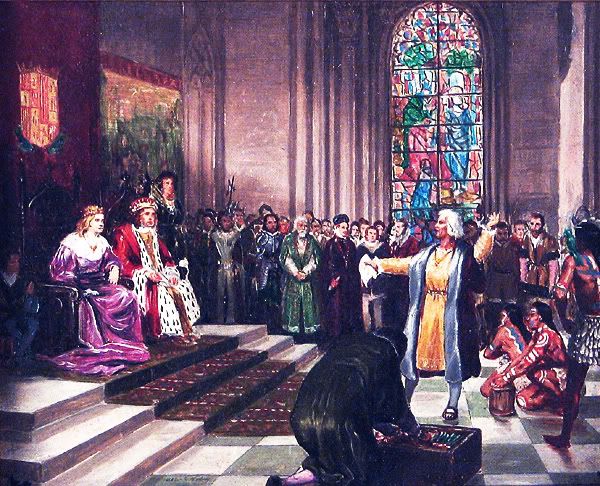
NEXT: The Tale of the Spanish Mission!
 Spanish sailor Cristobal Colon was one of the few people to answer to Queen Isabella's call for intrepid sailors who would be willing, in the name of Spain, to search for the New World and return with maps. His bid was temporarily put down with the death of Isabella and the rise of Gaspar Guzman de Olivares, who balked at any notion of exploration and instead focused on establishing his own power. Unfortunately the Conquistadors under Carlos V were successful and Isabella's lineage was returned to the throne. Carlos revived Isabella's plan for exploration of the new world, and called upon the services the young and ambitious Cristobal Colon... except he was no longer young, and hardly ambitious. After negotiating a deal with Emperor Carlos V and his chief Naval Officer, Admiral Jose Maria de Hidalgo, they convinced the old man to muster his men for one last voyage; one that would make him the governor of any new territory discovered for Spain.
Spanish sailor Cristobal Colon was one of the few people to answer to Queen Isabella's call for intrepid sailors who would be willing, in the name of Spain, to search for the New World and return with maps. His bid was temporarily put down with the death of Isabella and the rise of Gaspar Guzman de Olivares, who balked at any notion of exploration and instead focused on establishing his own power. Unfortunately the Conquistadors under Carlos V were successful and Isabella's lineage was returned to the throne. Carlos revived Isabella's plan for exploration of the new world, and called upon the services the young and ambitious Cristobal Colon... except he was no longer young, and hardly ambitious. After negotiating a deal with Emperor Carlos V and his chief Naval Officer, Admiral Jose Maria de Hidalgo, they convinced the old man to muster his men for one last voyage; one that would make him the governor of any new territory discovered for Spain.It was around this time that the Northern Alliance (Inca, English) decided to release a plan calling for organization of the New World settlements, their own official claim to the entire New World, and of course plans to give land grants to countries in need (such as America, France, and Germany). Part of the statement was particularly bothersome to the Emperor...
Section 4) Any military units (settlers included, but not scouting units) involved in any actions not sanctioned or previously accorded in these proceedings will be considered hostile and dealt with swiftly by all participating members. If this shall result in declarations of war between nations, they will be considered, at least by the Northern Alliance members, valid only in the new continent (i.e. there will be no military reprisals in the “Old World” as a result).
The following is a collection of excerpts from the journals of General DeMores, Cristobal Colon, and Admiral Hidalgo...
1288 a.d. - The people on the ship are growing restless, rumors of a mutiny have begun. I knew I should have stayed home, I knew once the war started and I lost support of the throne I had been saved from a terrible mistake. We have no proof of the New World! Only stories from the English and Inca, who have been our enemies as of late. Our Emperor believes them! It is quite foolish indeed, and this should prove how much faith in this mission and the so-called Admiral. It is insane that I, a merchant of great experience and expertise, have to succumb to the will of this boy Admiral, this Hidalgo. What could he possibly know about ships? Spain doesn't have a navy! Well, it seems as if dinner has been prepared, that is the one thing I can say about this mission - thus far we have been well stocked with food.
-Cristobal Colon
 1292 a.d. - We have seen many things on our journey, but the latest two things have been the most promising; a Chinese ship, and land! Glorious land! There has been no evidence of natives, however, we've only seen forests and hills so far, no sign of roads, farming, mining, or even any smoke. We are begining to think this world may be uninhabited, but we can be sure from the absence of development that we are seeing virgin soil (unless of course we are somewhere undeveloped, like France, which would prove to be embarassing). Even the melencholy mood of that old man Cristobal has improved, the second he saw the Chinese ship you should have seen his eyes; he was so worried that there would be an insurrection, but we have enough men to contain any type of uprising, besides, these sailors will be payed handsomely when we return to Spain. In any event we should reach land very shortly, of course our first order of business will be to ensure that we have a place to break camp, and potentially leave behind a few people while the rest remain on the ship to explore the rest of this continent.
1292 a.d. - We have seen many things on our journey, but the latest two things have been the most promising; a Chinese ship, and land! Glorious land! There has been no evidence of natives, however, we've only seen forests and hills so far, no sign of roads, farming, mining, or even any smoke. We are begining to think this world may be uninhabited, but we can be sure from the absence of development that we are seeing virgin soil (unless of course we are somewhere undeveloped, like France, which would prove to be embarassing). Even the melencholy mood of that old man Cristobal has improved, the second he saw the Chinese ship you should have seen his eyes; he was so worried that there would be an insurrection, but we have enough men to contain any type of uprising, besides, these sailors will be payed handsomely when we return to Spain. In any event we should reach land very shortly, of course our first order of business will be to ensure that we have a place to break camp, and potentially leave behind a few people while the rest remain on the ship to explore the rest of this continent.-Admiral Hidalgo
1292 a.d. - These sailors are a joke! I can't wait to see some action, the Chinese commanders have already told me rumors that we were sending another ship, with more troops, under the command of Prince Carlos VI! I can't wait, but in case these are lies I want to keep it from the old man and the Admiral, they don't need to know about this, it will make the sailors lazy anyway. It is going to be there job to find food for everyone, and if they think we have armies coming they'll stop, I know this lot, they are about as loyal as the Imperial coffers allow them to be. Supposedly there is a barbarian Empire in this continent's interior, they call themselves the Numidians. The Chinese say they have an impressive city, but not as impressive as the Sarmatians, we will see how impressive these barbaric weapons can be, hopefully sooner rather than later.
-General DeMores
 1293 a.d. - We reached land sometime in the morning that day, and decided to make our presence felt by lodging the banner of the Holy Spanish Empire and spreading the word of God to the natives, who told us of two tyrannical Empires; the Numidians and Sarmatians, who had control of this area of the New World. They assured us that despite their own simple existance, the Numidians and Sarmatians had powerful armies and lived in large cities that were said to rival even those of Spain! My men were already worried, and wished to return to the ship, which we did. When I told General DeMores about the barbarian Empires he assured me that Spain would crush them, and said from now on our mission would be to discover their locations and bring in military forces. It had also come to his attention that our diplomats had made an agreement with the Inca which would in turn bring a force of Spanish Conquistadors to the area, so many things are happening this old man is feeling a bit overwhelmed.
1293 a.d. - We reached land sometime in the morning that day, and decided to make our presence felt by lodging the banner of the Holy Spanish Empire and spreading the word of God to the natives, who told us of two tyrannical Empires; the Numidians and Sarmatians, who had control of this area of the New World. They assured us that despite their own simple existance, the Numidians and Sarmatians had powerful armies and lived in large cities that were said to rival even those of Spain! My men were already worried, and wished to return to the ship, which we did. When I told General DeMores about the barbarian Empires he assured me that Spain would crush them, and said from now on our mission would be to discover their locations and bring in military forces. It had also come to his attention that our diplomats had made an agreement with the Inca which would in turn bring a force of Spanish Conquistadors to the area, so many things are happening this old man is feeling a bit overwhelmed.-Cristobal Colon
1301 a.d.- We continued on our quest to map the continent, which was proving to be much larger than anticipated. The General stayed behind to meet the troops arriving from Cuzco, while Cristobal and I commanded the fleet towards the south of the continent, it came to our attention that the English had already established settlements including the conquest of the Vandal empire, and the territory of Illinois, word from the English claimed that the Sarmatian Empire was due north of Illinois but warned us that Sarmatian ships were powerful, and would challenge our authority over the seas. We weren't worried however, as there was no evidence to support that the natives had the technological advancements we had; clearly there were roads, but none that could compare to those in the old Continent.
-Admiral Hidalgo
1306 a.d. - Our soldiers reached the New World along with Prince Carlos VI, who I was pleased to meet. He had recently married the daughter of the great General Mendoza and wanted to establish himself as a military commander; so he came along with the Conquistadors. We met with the Incan army, and things were quite tense at first, however we learned to work together and it showed that through cooperation we could settle our differences, it was from the coast that we marched towards Numidia, the capital city of the heathen Numidians...
-General DeMores

1310 a.d. - After three years of battle we finally broke the city walls, I suffered some slight injuries but two whole garrisons of Conquistadors bravely lost their lives at the walls of Numidia, a combined force of Incan, Spanish, and English troops took the barbarian city down to the jubilation of the surrounding natives. I will have to spend much time here with Prince Carlos VI as the Incans have no officials to rule the city, so it is going to be up to us to stamp out the Numidian insurgency and establish order in the city. We will then make our treck to Sarmatia, as the Prince assures us that Spanish Cavalry will soon arrive in the area...
-General DeMores

 1314 a.d. - Under the command of Prince Carlos VI our forces marched east towards a hold-out Numidian village, which was quite easy to defeat (their only forces were crude bowmen), the village was plundered of the small riches it had and the natives were questioned as to the location and power of the Sarmatian Empire. Apparently prior to the landing of the Inca, the Numidians and Sarmatians had brokered a peace which gave them control of the entire area, including control over the natives. The villagers told us that one such village was to our east, and north of that area would be the Sarmatian capital. Our men fought bravely and destroyed the second village, finally arriving at Sarmatia, which was quite large and well defended.
1314 a.d. - Under the command of Prince Carlos VI our forces marched east towards a hold-out Numidian village, which was quite easy to defeat (their only forces were crude bowmen), the village was plundered of the small riches it had and the natives were questioned as to the location and power of the Sarmatian Empire. Apparently prior to the landing of the Inca, the Numidians and Sarmatians had brokered a peace which gave them control of the entire area, including control over the natives. The villagers told us that one such village was to our east, and north of that area would be the Sarmatian capital. Our men fought bravely and destroyed the second village, finally arriving at Sarmatia, which was quite large and well defended.-General DeMores
 1328 a.d. - We should have listened to the English! The Sarmatian fleet met us just north of Illinois, and the Admiral decided to engage them directly, causing the death of numerous sailors and soldiers despite our victory. Admiral Hidalgo said it would be best for us to beach our ship until we can finish repairs, and generally search the area, according to his map we should be quite close to the Sarmatian empire, and thus close to the forces of General DeMores and Prince Carlos VI. I am begining to think I will not survive this trek to make it back to Spain, let alone to govern any territory in this wild part of Terra. Perhaps history could be my prize, hopefully by the end of this journey my regrets will be gone. But alas, I realize that at any moment my life could end whether it by the hand of the heathens, or the hand of God Himself.
1328 a.d. - We should have listened to the English! The Sarmatian fleet met us just north of Illinois, and the Admiral decided to engage them directly, causing the death of numerous sailors and soldiers despite our victory. Admiral Hidalgo said it would be best for us to beach our ship until we can finish repairs, and generally search the area, according to his map we should be quite close to the Sarmatian empire, and thus close to the forces of General DeMores and Prince Carlos VI. I am begining to think I will not survive this trek to make it back to Spain, let alone to govern any territory in this wild part of Terra. Perhaps history could be my prize, hopefully by the end of this journey my regrets will be gone. But alas, I realize that at any moment my life could end whether it by the hand of the heathens, or the hand of God Himself.-Cristobal Colon
1328 a.d. - Hail the Spanish navy! Finally some action! The Sarmatian triremes were no match for us, and we sent them deep into the unforgiving sea with a message to their ancestors; you will soon be meeting the remnants of your people! Certainly the armies of DeMores and Carlos are close to Sarmatia, why else would they send this fleet against us? That old man Cristobal can worry all he wants, and complain about his men dying, but that is what they signed up for and they knew the risks of this voyage. I can't wait to return to Spain and tell the Emperor of my victory and of our successes, certainly Pope Paul will appreciate a New World for the one true faith to spread and grow in! I am quite optimistic, and hope to make it to Sarmatia before the battle ends, how glorious it will be to see the forces of Holy Spain smite the evil heathens!
-Admiral Hidalgo
 1347 a.d. - Captain William Manning, who was running things in England made a surprise visit to our camp, and held a meeting with Prince Carlos and I. He was happy to discover that Carlos VI married General Mendoza's daughter, Manning apparently had been a friend of Mendoza's many years ago, and appreciated hearing about Mendoza's granddaughter. He was a very nice man, who seemed to be unaffected by his rise to power, he expressed hopes that our countries could again be friends and discussed plans to use English troops to help the Spanish put down the Sarmatian defenses. It was quite strange to me how new everything was here, the New World was truly that; where else would you see Spain fighting alongside the Northern Alliance? Things were different here though, the treaties and feelings of the old world were gone and were replaced with a feeling of brotherhood, and mutual protection against unknown barbarian enemies. Captain Manning told us that English and Incan forces were on the way, and we would be wise to make camp among the forests in the hills near Sarmatia, he suggested that we not give word to the Sarmatians that we intend on attacking, and they may not bother us. Things were about to get interesting, and I could prove my salt as a General here on this day in Sarmatia!
1347 a.d. - Captain William Manning, who was running things in England made a surprise visit to our camp, and held a meeting with Prince Carlos and I. He was happy to discover that Carlos VI married General Mendoza's daughter, Manning apparently had been a friend of Mendoza's many years ago, and appreciated hearing about Mendoza's granddaughter. He was a very nice man, who seemed to be unaffected by his rise to power, he expressed hopes that our countries could again be friends and discussed plans to use English troops to help the Spanish put down the Sarmatian defenses. It was quite strange to me how new everything was here, the New World was truly that; where else would you see Spain fighting alongside the Northern Alliance? Things were different here though, the treaties and feelings of the old world were gone and were replaced with a feeling of brotherhood, and mutual protection against unknown barbarian enemies. Captain Manning told us that English and Incan forces were on the way, and we would be wise to make camp among the forests in the hills near Sarmatia, he suggested that we not give word to the Sarmatians that we intend on attacking, and they may not bother us. Things were about to get interesting, and I could prove my salt as a General here on this day in Sarmatia!-General DeMores

1350 a.d. - Finally the Incan and English troops arrived as Manning had promised, their catapults rained down fireballs upon the unsuspecting Sarmatian rabble. Incan, English and Spanish Cavalry punished their defenses, until finally our Conquistadors cleaned up the mess and the Spanish flag was raised over the city. Quickly the soldiers went to work dismantling the pagan shrines and altars in the city to make way for Christian missionaries. The insurgency raged on for many nights, but ultimately could not withstand our forces. The Emperor will be proud, as proud as I am today, of the work we have done and would be quite interested to note that the Incan and English kept up their end of the deal, so now we had to keep up ours. The Prince named Cristobal Colon the governor, but will rule the city until his arrival with Admiral Hidalgo, I am sure both will be impressed with the skill displayed by the Spanish military.
-General DeMores

 1350 a.d. - When we reached the city it was hard to tell whether or not the day was ours, until General DeMores himself ran into the sea holding up a large blue banner holding the crest of Spain and the House of Bourbon (to which Prince Carlos VI held his allegience). We knew then that we were safe, and the look on Cristobal's face was priceless; it was the face of an old man, who had worked hard all of his life finally seeing his retirement, he would be governor of Sarmatia - the largest Empire in the New World - he would be the favorite of the Emperor, and would be known throughout history as the man who cased this, despite his lack of actual involvement in the military victories. Regardless, I am happy for him, he put a lot on the line out here and everything worked out for him. I am sure all of us will return to Spain with more prestige than when we left it. I myself have changed, early on in the voyage, when we left Santo Rodrigo I thought they sent me on a wild goose chase! Braving the icebergs of the harsh nothern oceans, I thought this was a futile attempt. But now I realize what glory we have achieved, I can say to my family and friends when I return, to my Emperor, that I braved the mysterious seas, the dark jungles, and the raging barbarians of the New World for Spain! I was proud to do it, and I will never forget this journey and the sacrafices of the brave sailors and soldiers, Spanish, English, Incan alike, who risked their lives for glory, God and Country!
1350 a.d. - When we reached the city it was hard to tell whether or not the day was ours, until General DeMores himself ran into the sea holding up a large blue banner holding the crest of Spain and the House of Bourbon (to which Prince Carlos VI held his allegience). We knew then that we were safe, and the look on Cristobal's face was priceless; it was the face of an old man, who had worked hard all of his life finally seeing his retirement, he would be governor of Sarmatia - the largest Empire in the New World - he would be the favorite of the Emperor, and would be known throughout history as the man who cased this, despite his lack of actual involvement in the military victories. Regardless, I am happy for him, he put a lot on the line out here and everything worked out for him. I am sure all of us will return to Spain with more prestige than when we left it. I myself have changed, early on in the voyage, when we left Santo Rodrigo I thought they sent me on a wild goose chase! Braving the icebergs of the harsh nothern oceans, I thought this was a futile attempt. But now I realize what glory we have achieved, I can say to my family and friends when I return, to my Emperor, that I braved the mysterious seas, the dark jungles, and the raging barbarians of the New World for Spain! I was proud to do it, and I will never forget this journey and the sacrafices of the brave sailors and soldiers, Spanish, English, Incan alike, who risked their lives for glory, God and Country!-Admiral Hidalgo
Back in Madrid, Years Later...
Cristobal Colon became the Imperial Governor of Sarmatia, which was renamed San Pedro in honor of Czar Peter II who converted Russia to Christianity. He returned to Madrid with gold plundered from the campaign, which was well recieved in the courth of Carlos V, he also brought slaves, spices, and tales of adventure that all Spaniards could be proud of. He brought back a newfound respect for the English and Inca as well, who fought alongside the Spanish like brothers. For his role in the voyage Cristobal was named an Admiral of Spain, and given title and a small estate in Aragon (not to mention his posessions in the New World). The Emperor would later say that when Colon mentioned he was old, and happy he could finally retire, it made him consider his own retirement as well...

NEXT: The Tale of the Spanish Mission!


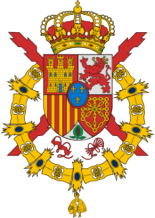
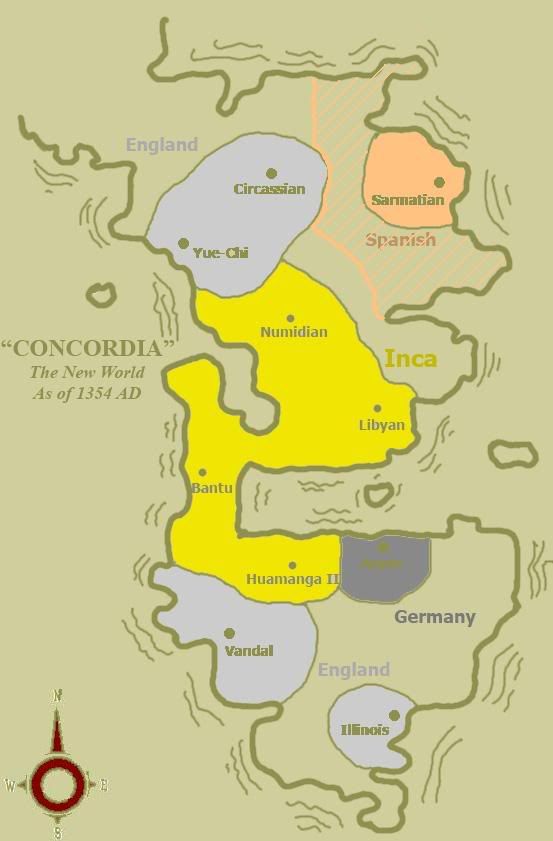
Comment